China’s vast security apparatus has moved swiftly to smother mass protests that swept the country, with police patrolling streets, checking cell phones and even calling some demonstrators to warn them against a repeat, CNN reports:
In major cities on Monday and Tuesday, police flooded the sites of protests that took place over the weekend, when thousands gathered to vent their anger over the country’s tough zero-Covid policy — some calling for greater democracy and freedom in an extraordinary show of dissent against Chinese leader Xi Jinping.
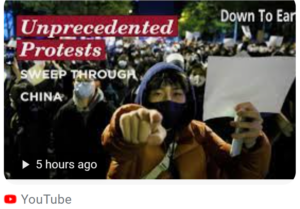 China’s health authorities on Tuesday blamed local governments for their handling of coronavirus outbreaks as Beijing distanced itself from the crisis after unprecedented protests against President Xi Jinping and his Zero-Covid policy, The FT reports:
China’s health authorities on Tuesday blamed local governments for their handling of coronavirus outbreaks as Beijing distanced itself from the crisis after unprecedented protests against President Xi Jinping and his Zero-Covid policy, The FT reports:
The National Health Commission reaffirmed Beijing’s commitment to the Zero-Covid measures and pledged to boost vaccination rates among the elderly, a day after police and security forces appeared to have stamped out demonstrations across at least 18 cities.
Beware of black-swan incidents,” China’s leader, Xi Jinping, told an audience of Communist Party comrades a few years ago, invoking the image of an unforeseen risk. The General Secretary continued, “And watch out for gray rhinos”—a reference to another type of peril, one that goes unrecognized because it lurks in plain sight, The New Yorker’s Evan Osnos writes:
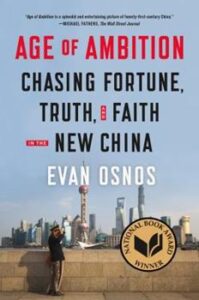 Now, nearly four years after Xi offered those warnings, he faces public protests that represent the boldest domestic political challenge to the government in decades. How, and whether, he can resolve it may hinge on which of his chosen metaphors he believes is bedevilling him more.
Now, nearly four years after Xi offered those warnings, he faces public protests that represent the boldest domestic political challenge to the government in decades. How, and whether, he can resolve it may hinge on which of his chosen metaphors he believes is bedevilling him more.
Xi appears to be wagering that by outwardly ignoring the demonstrations, he can sap their momentum while the security services move in and the party’s army of online loyalists try to discredit protesters as tools of American-led subversion, The Times reports.
“They’re saying as little as possible for as long as possible,” said William Hurst, a professor at the University of Cambridge who studies politics and protest in China. “If they speak, it could inflame the situation, so it’s better to sit back and pretend nothing is happening.”
“The moment that the central leadership takes an official line, they are dignifying the protests with an official response and admitting that they must be reckoned with, which gives them a status that they would rather deny them,” he added.
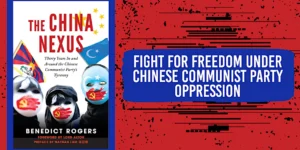 These are very significant protests in three respects, Claremont McKenna College Professor Minxin Pei told PBS’s Nick Schifrin (above):
These are very significant protests in three respects, Claremont McKenna College Professor Minxin Pei told PBS’s Nick Schifrin (above):
- First, for the first time, we have seen simultaneous protests in major Chinese cities.
- But the other thing about this round of protests is that participants seem to come from a wide range of social backgrounds. And that has not happened in the last 30 years.
- And, third and most importantly, some of the demands are explicitly political. We have now heard ordinary people chanting for Xi Jinping and the Communist Party to step down. So, all these three things make these protests very, very significant.
“In retrospect, protests like this are bound to happen, because Zero Covid is a policy that, initially, people could put up with, in the hope that it’s going to be limited in duration, and that the end result will be positive,” Pei, a National Endowment for Democracy (NED) board member, told The New Yorker’s Osnos. “But now people in China are faced with this cruel reality that there is no change in sight.”
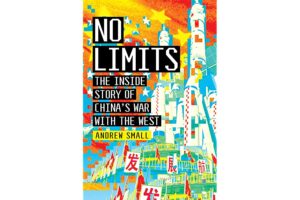 Mass, anti-government protests with a unified message breaking out in different cities? That’s a “no-go zone,” said Matt Schrader, an advisor for China at the International Republican Institute. But, he said, the blank paper protest, a tactic demonstrators also used in Hong Kong in 2020, has layers of symbolism, The Washington Post adds.
Mass, anti-government protests with a unified message breaking out in different cities? That’s a “no-go zone,” said Matt Schrader, an advisor for China at the International Republican Institute. But, he said, the blank paper protest, a tactic demonstrators also used in Hong Kong in 2020, has layers of symbolism, The Washington Post adds.
“It’s the idea that when no form of protest at all is acceptable to the state, then the only thing that you could possibly hold up that won’t offend anybody in power is a blank piece of paper,” he said. “It’s the idea that any real form of protest online will mostly be censored.”
But groups of Chinese people “shouting on a road in Shanghai,” where some went so far as to demand that Xi step down, and the other rallies do not a revolution make, said Robert Daly, a former U.S. diplomat in China who now heads the Kissinger Institute on China at the Wilson Center think tank.
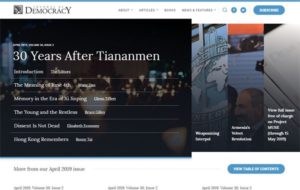 “People are eager to see echoes of Tiananmen,” Daly told the LA Times, referring to the 1989 pro-democracy protests in the Beijing square and subsequent crackdown, “but I don’t see it. There is national discontent with the prices of COVID. But this is not a national movement.”
“People are eager to see echoes of Tiananmen,” Daly told the LA Times, referring to the 1989 pro-democracy protests in the Beijing square and subsequent crackdown, “but I don’t see it. There is national discontent with the prices of COVID. But this is not a national movement.”
Western democracies should do far more to support the protesters, including “unequivocal and specific warnings to China about the consequences of any bloody crackdown,” former Tiananmen Square protester Jianli Yang wrote in a Monday op-ed in the Washington Post.
Repressive options
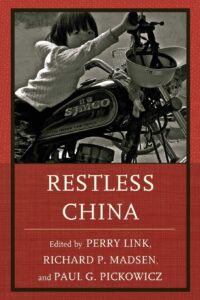 The government’s response has not been restrained. It is true that no tanks or machine guns have been deployed, as they were in 1989, but that’s because the regime wants to keep the repression invisible if it can. Instead it is using plainclothes police to detain protesters one by one, adds Perry Link of UC Riverside:
The government’s response has not been restrained. It is true that no tanks or machine guns have been deployed, as they were in 1989, but that’s because the regime wants to keep the repression invisible if it can. Instead it is using plainclothes police to detain protesters one by one, adds Perry Link of UC Riverside:
The government’s vaunted Skynet system of street cameras, with its accompanying facial-recognition software, is by far the best in the world. Every protester must anticipate that sooner or later he or she will be found, interrogated, threatened, and, if none of that works, punished.
Tanks and machine guns will be used only if a large number of protesters (thousands or more) do a sit-in at one location, as happened at Tiananmen in 1989. Will that happen? I doubt it. But will Xi Jinping do a repression? There can be no question at all that he will. It has already begun.
“I am pretty sure that the security apparatus will get this under control fairly quickly,” said H. Christoph Steinhardt, a scholar at the University of Vienna who studies patterns of protest in China. “I guess they will begin with identifying ringleaders and then leaning on them, combined with preventive policing in public areas,” he told The Times.
Drew Thompson, a visiting senior research fellow at the National University of Singapore, added that it was also important to note that Chinese police had “tremendous capacity… [and] the ability of China to control these protests going forward… is quite high,” the BBC reports. Censorship has gone into overdrive on Chinese social media platforms since the weekend’s protests, to stop people seeing and discussing them.
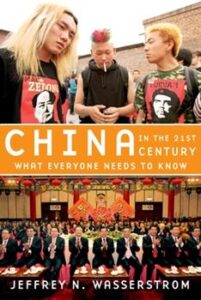 “The authorities have a varied repertoire of repressive moves,” China historian Jeffrey Wasserstrom told Osnos. “There will be efforts to denigrate the protests, ways to spin them, flooding the Internet with things trying to show how bad things are in other parts of the world.”
“The authorities have a varied repertoire of repressive moves,” China historian Jeffrey Wasserstrom told Osnos. “There will be efforts to denigrate the protests, ways to spin them, flooding the Internet with things trying to show how bad things are in other parts of the world.”
In any case, he added, the fury revealed in recent days should force analysts to reassess the assumption that China’s population is willing to tolerate Xi’s totalitarian instincts as a price for relative stability. “What’s unusual in this case is that it wasn’t just a reaction on the Web, but also people taking action,” Wasserstrom said. “It’s a useful reminder not to write off a generation for being brainwashed.”
Chinese police have turned out in force, in an effort to head off another night of protests, Channel 4 reports (below). Dozens of people were arrested at the weekend, while strict censorship has wiped videos and messages about the protest off Chinese internet sites. The authorities are determined to clamp down on the kind of civil unrest not seen for decades.







